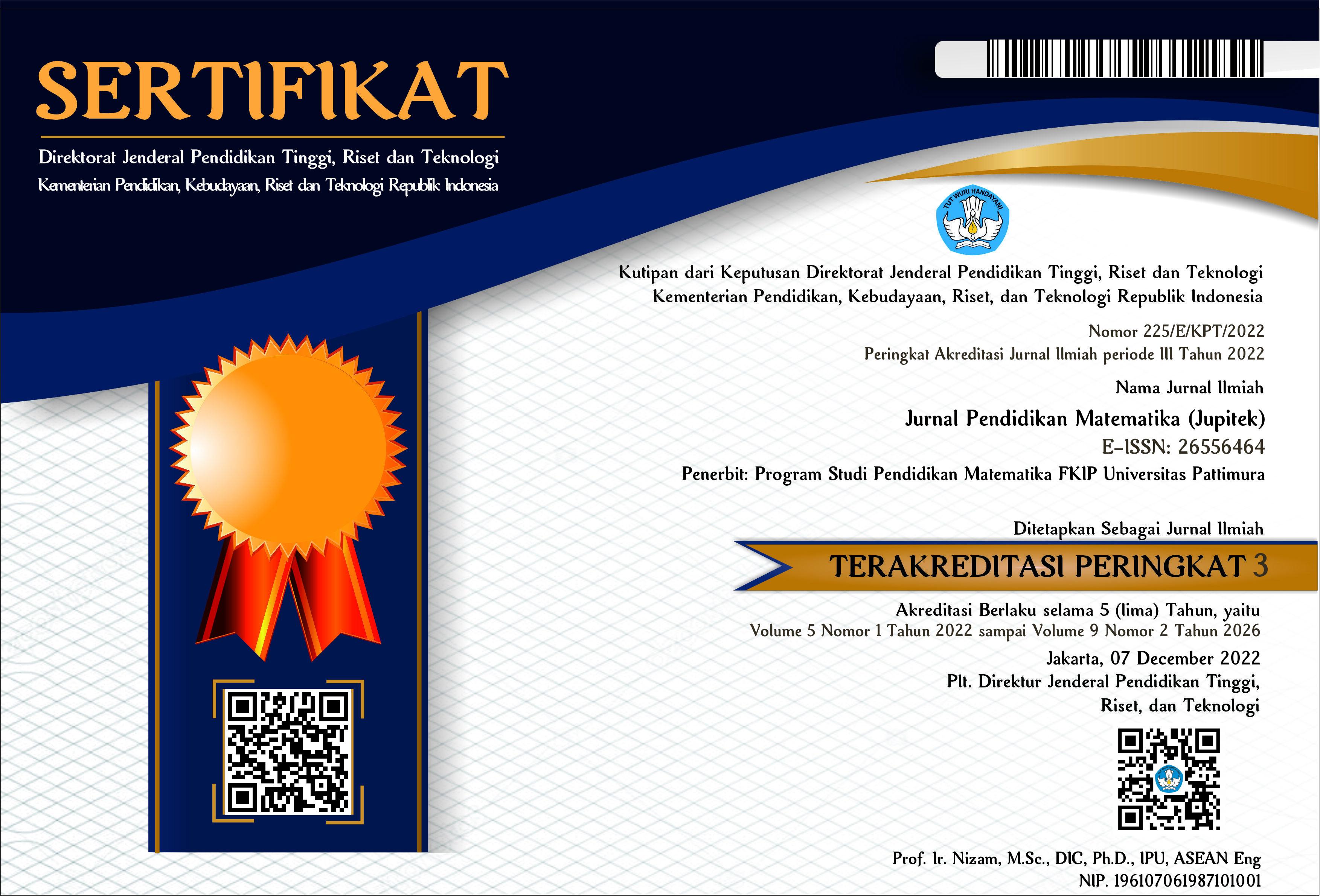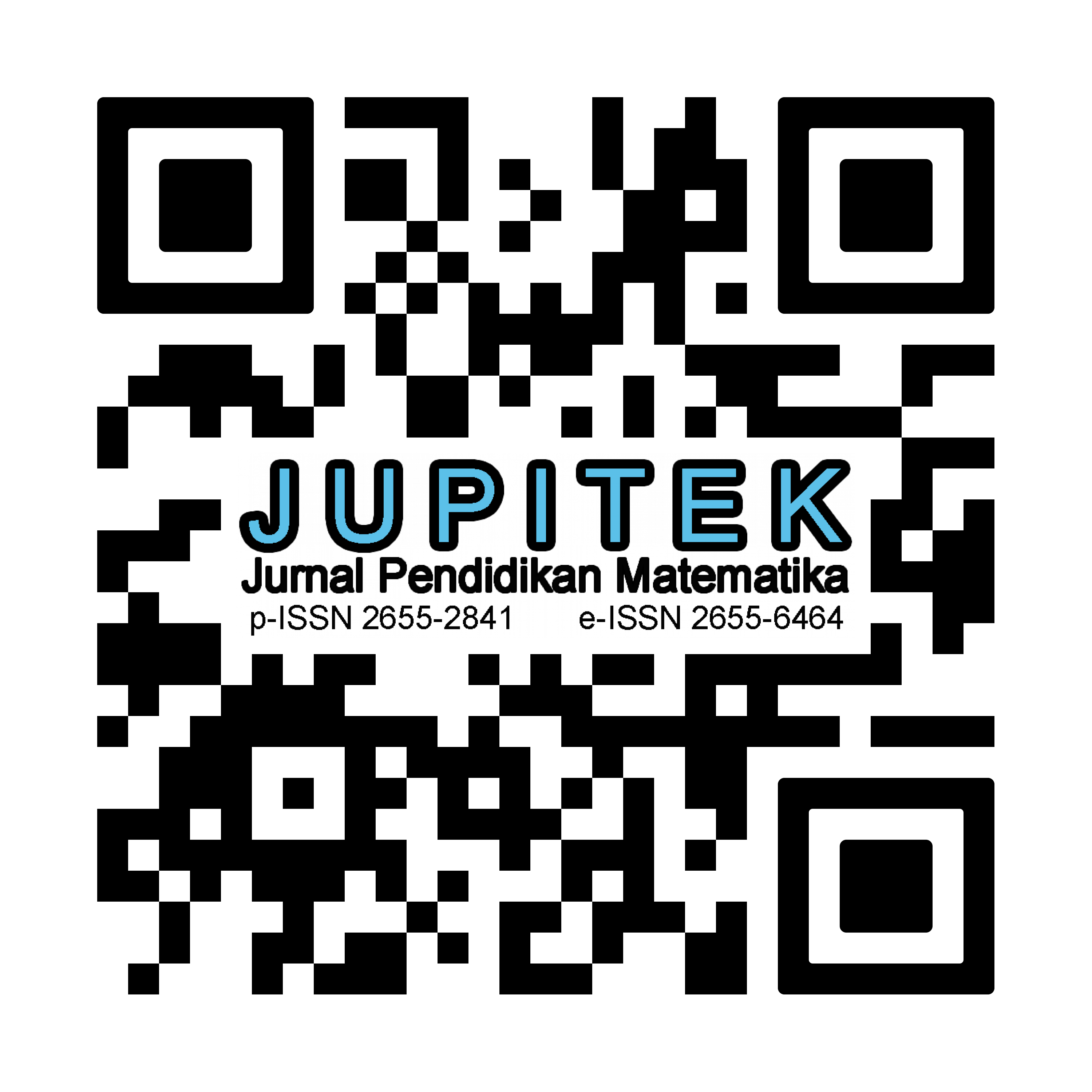PENGEMBANGAN PERANGKAT PEMBELAJARAN SISTEM PERSAMAAN LINEAR DUA VARIABEL DENGAN MODEL PROBLEM BASED LEARNING
Abstract
Learning model that meets the criteria of being valid, practical and effective. This research is categorized as development research. This study uses the ADDIE model developed by Dick and Carey. There are five stages, namely: 1) Analysis, 2) Design, 3) Development, 4) Implementation, and 5) Evaluation. The learning tools produced in the study were the lesson plan (RPP), student activity sheets (LKPD) and evaluation of learning outcomes (EHB). The results showed that the products developed to meet the criteria of validity, practicality, and effectiveness. The learning device is feasible to use with an average score of the learning device assessment from the validate of 3.5 with valid criteria. The practicality of the learning device was seen from the student response questionnaire which gave a positive response and the teacher's ability to manage learning at the first meeting with an average of 3.69 and the second meeting of 3.46 which reached the good category, which was located in the interval 3.50 ≤ TKG < 4 , 50. The effectiveness of the learning device is seen from the test of student learning outcomes which shows the value of student learning completeness by an average of 80%.
Downloads
References
Endang Mulyatiningsih. (2013). Metode Penelitian Terapan Bidang Pendidikan. Bandung: Alfabeta.
Mardapi Djemari, 2012. Pengukuran Penilaian & Evaluasi Pendidikan. Yogyakarta: Nuha Medika.
Mulyasa, E. 2005. Menjadi Guru Profesional. Bandung: PT. Remaja Rosda Karya
Nieveen, N. (1999). “Prototype to reach product quality. Dlm. van den Akker, J., Branch, R.M., Gustafson, K., Nieveen, N., & Plomp, T. (pnyt.)â€. Design approaches and tools in educational and training. Dordrecht: Kluwer Academic Publisher.
Permendikbud Nomor 20 Tahun 2016 tentang Standar Kompetensi Lulusan Pendidikan Dasar Dan Menengah.
Permendikbud Nomor 23 Tahun 2016 Tentang Standar Penilaian Pendididkan.
Slameto. (2013). Belajar dan Faktor-Faktor yang Mempengaruhinya. Jakarta: PT Rineka Cipta.
Soemanto, Wasty. (2006). Psikologi Pendidikan: Landasan Kerja Pemimpin Pendidikan (Cetakan Ke 5). Jakarta: Rineka Cipta.
Trianto. (2009). Mendesain Model Pembelajaran Inovatif Progresif.Surabaya: Kencana
Trianto. (2010). Model Pembelajaran Terpadu. Jakarta: Bumi Aksara
Trianto. (2012). Model Pembelajaran Terpadu. Jakarta: Bumi Aksara
Copyright (c) 2021 Rosalinda Paulina Lainata, I Wayan Damai, Anekke Pesik

This work is licensed under a Creative Commons Attribution-NonCommercial-ShareAlike 4.0 International License.
License and Copyright Agreement
By submitting a manuscript to Jurnal Pendidikan Matematika (JUPITEK), the author(s) certify and agree to the following terms:
- Originality and Authority: The submitting author is authorized by all co-authors to enter into this agreement. The manuscript describes original work that has not been published previously in a peer-reviewed journal, nor is it under consideration for publication elsewhere.
- Approval: Its publication has been approved by all author(s) and by the responsible authorities of the institutions where the work was carried out.
- Rights: The authors secure the right to reproduce any material that has already been published or copyrighted elsewhere.
- Licensing and Copyright: Authors retain the copyright to their work.
- License Grant: The authors grant Jurnal Pendidikan Matematika (JUPITEK) the right of first publication, with the work simultaneously licensed under the Creative Commons Attribution-NonCommercial-ShareAlike 4.0 International (CC BY-NC-SA 4.0).
- Self-Archiving: Authors are permitted and encouraged to deposit the published version of their article in institutional repositories, on their personal websites, and other academic platforms, with proper acknowledgment of its initial publication in Jurnal Pendidikan Matematika (JUPITEK).






.png)


